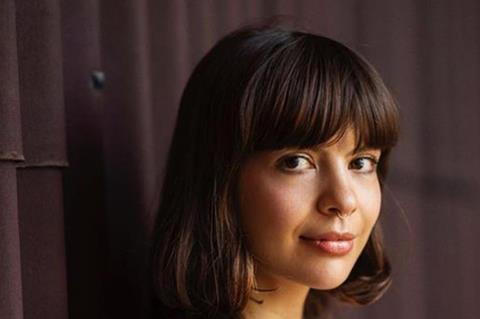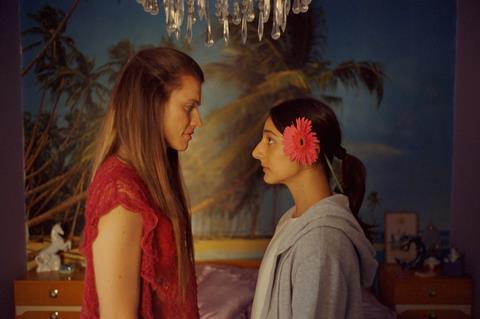
Fantasy, the debut feature of Slovenian-Macedonian artist-filmmaker Kukla, is based on her work Sisters, which won the Grand Prix at Clermont-Ferrand short film festival in 2021.
Screening in Sarajevo’s feature film competition after its world premiere in Locarno earlier this month, Fantasy tells the story of Mihrije, Sina and Jasna, best friends in their 20s who live in Slovenia. Tomboys who refuse to conform to the conservative system they live in, their world turns upside down when they meet a transgender woman named Fantasy. Together, they embark on a journey that explores the complexities of gender, desire, and self-discovery.
Totem Films is handling international sales.
Screen spoke to Kukla – real name Katarina Bogdanovic – about adapting her short, casting the lead roles and bringing together the finance.
How did you turn your short film into a feature?
When I finished film school I had no experience with the long form, so I first made Sisters as a case study for a feature.
I cast the same actresses from Sisters, who I found mostly through street casting: Sarah Al Saleh, Mia Skrbinac and Mina Milovanovic.
The role of Fantasy went to Alina Juhart, who is a professional. It was important for me she is played by a trans woman and that she had a strong chemistry with Sarah, who plays Mihrije. I was looking for people who had the essence of the character in themselves so that they can authentically convey it.
Of the other three actresses, only Mia Skrbinac, who plays Jasna, is a professional. We spent a lot of time hanging out and sharing experiences and it turned into a powerful friendship. I took them to Fantasy’s home, which we filmed at the brutalist tenement block in Trieste, the Rozzol Melara. Slovenia is a small country and I didn’t want local audiences to recognise the place and attach to it.
I always work by immersing myself and the actors in the world of the film, and production designer Maja Savc did a fantastic job with Fantasy’s flat. When we went in we immediately entered this fairytale of hers. This is very important when working with non-professionals.
You went to a number of development workshops with this project. How did they contribute to the shape of the film?
I first went to the screenwriting workshop Scenarnica in Slovenia in 2019-2020, then to Les Arcs Talent Village in 2021 and First Films First in 2021-2022, and Cannes Cinefondation in 2022. I also pitched at one of Torino Film Lab’s script workshops. You can get a lot out of these, but I also realised I shouldn’t always go to such events, because I’ve always had to do things my own way.
That’s why one-on-one sessions with script advisors are more suitable for me. I had a mind-blowing four-hour session with Jacques Akchoti at Cinefondation, I got more useful input from this than in all the other workshops combined.
They are all useful as a stamp of approval, which I am not so comfortable with because I feel that some quality projects that don’t go to workshops don’t get this recognition.
But a good thing with these workshops is a multitude of views. They challenged me, especially about the visual approach. In our region people are so used to one particular visual style that when you have a different approach, you are labelled as overly formalistic.
And I simply see the world that way [of the film]. It’s my organic expression, it’s not planned. Every technical aspect is always in the service of the story and essence of the film. I never allowed myself aesthetise things just for the sake of it.

Where did the budget come from?
Our Slovenian production company December received development money from Creative Europe MEDIA. In Slovenia we didn’t get funding for script or project development, but we got production money – €350,000, plus €70,000 from the Slovenian national broacaster, and production funding of about €40,000 in North Macedonia through the company Krug Film.
My frequent collaborator Petar Perunovic and I had to invest our own money in order to close the budget, and there were also some in-kind contributions.
This is a co-production between Slovenia and North Macedonia, but there are actors and crew members from many other places.
Both the co-production and selection of cast and crew came out of the story. Often co-productions require you to pick a location or story element that you then push into your screenplay, but here it wasn’t the case.
This was all part of my second-generation immigrant experience and my story, including the segment in which they go to North Macedonia, where my mother comes from. We used her house as the location. Identity is the overarching theme of the film and I had to stay true to myself.
I decided to work with my husband Lazar Bogdanovic as the DoP, even though it was complicated as we had a small kid. A part of the crew came from Serbia, because we often work on music videos there. The story is multi-cultural and multi-lingual; we had actors from Albania, Kosovo, Serbia and North Macedonia. Our colorist, Yerlan Tanayev, is from Kazakhstan, living in LA. Composer Relja Cupi , who has a great sensibility for contemporary sound, is from Montenegro.

























No comments yet